#Jephthah
Explore tagged Tumblr posts
Text
Alrighty so I've got an idea for a rewrite of Hazbin Hotel's Adam: Don't make him Adam, but Jephthah.
If you don't know what the hell I'm talking about: Jephthah's a guy in the Bible who was a warrior. He promised God that he would sacrifice for him the first thing that greeted him when he came home in exchange for beating the Ammonites. God said "sure bud lol" and when Jepthah came home his daughter was the first one to greet him, much to both of their dismay. After bewailing her virginity for 2 months Jephthah's daughter was sacrificed to God.
These videos can help explain things.
youtube
youtube
youtube
Making him the leader of the angels would make sense since he was already a mighty warrior in the Bible. Here I imagine he'd be more of a pawn that's manipulated and lied to, definitely more tragic than the one note sexist pig we get in canon. He's pretty pissed about being forced to sacrifice his daughter.
Speaking of Jephthah's daughter, you could make Lute his daughter. Perhaps the two were cursed never to recognize each other or something. And in that case you could have it to where the curse is broken when Jephthah dies, his only relief being that he finally got to see his daughter again one last time. Lute gets angry at the main crew for killing her father and plots their destruction.
#anti hazbin hotel#hazbin hotel criticism#hazbin hotel critical#hazbin hotel rewrite#anti vivziepop#vivziepop critical#vivziepop criticism#hazbin hotel adam#hazbin adam#Lute#Jephthah#Jephthah's Daughter#Yeah the story of Jephthah's Daughter is very sad and fucked up#And it makes God look like a colossal asshole
104 notes
·
View notes
Text

Jephthah Meets His Daughter
Artist: Hieronymus Francken III (Flemish, 1611-1671)
Date: By 1661
Medium: Oil on copper
Jephthah Meets His Daughter
Jephthah served as a judge over Israel for six years following the leadership of Jair. His account is recorded in Judges 11:1—12:7.
Later, the Ammonites came against Israel in war. The Israelites sent for Jephthah, asking for his help. The elders of Gilead offered to serve Jephthah if he helped them defeat their enemy. Jephthah accepted their offer and then sent a message to the Ammonite king in an attempt to avoid war.
The Ammonite king rejected Jephthah’s message, and war was inevitable. Jephthah made a vow to God, saying, “If you give the Ammonites into my hands, whatever comes out of the door of my house to meet me when I return in triumph from the Ammonites will be the Lord’s, and I will sacrifice it as a burnt offering” (Judges 11:30–31). Jephthah then defeated the Ammonites and returned home to Mizpah (Judges 11:32–34).
When Jephthah arrived at home, his daughter, an only child, was the first to come out of his house (Judges 11:34). Jephthah evidently expected an animal to exit, but this unexpected event caused him to tear his clothes in mourning. When he told his daughter of his vow, she surprisingly accepted the consequences, only asking for two months to mourn beforehand (Judges 11:37–38). The event was so well-known among the Israelites that it became a custom for the daughters of Israel to mourn the event each year for four days.
#painting#artwork#jephthah#landscape#oil on copper#israelites#israelite judge#victory#celebration#gilead#bible story#book of judges#soldiers#tambourine#women#men#flags#horses#baroque style#hieronymus francken iii#flemish painter#flemish culture#european art#17th century painting#biblical art
6 notes
·
View notes
Text


Top: Abraham interceding for Sodom and Gomorrah. Bottom: Moses pleading for Israel.
We read that the Lord said to Moses Let me alone, to vent My anger upon them [Exodus 32:10a], and to Jeremiah, Therefore offer no prayer for these people nor stand in my path [Jeremiah 7:16]. By these words the Lord Himself makes it clear that the prayers of the devout set a kind of bridle on His wrath and check it from raging against sinners as fully as they deserve; just as a man who is willingly moved by his sense of justice to take vengeance can be turned aside by the entreaties of his friends and forcibly restrained, as it were, against his will. Thus when the Lord says to one who is praying or about to pray, "Let Me alone and do not stand in My path," He forbids prayers to be offered to Him on behalf of the impious; yet the just man prays though the Lord forbids, obtains his requests and alters the sentence of the angry Judge. And so the passage about Moses continues: And the Lord repented and spared His people the evil with which He had threatened them [Exodus 32:14]. Elsewhere it is written about the universal works of God, He spoke, and it was [Psalm 33:9]. But in this passage it is also recorded that He had said the people deserved affliction, but He had been prevented by the power of prayer from carrying out His words. Consider then the great power of prayer, if we pray as we are bidden, seeing that the prophet won by prayer what he was forbidden to pray for, and turned God aside from his declared intention. And another prophet says to God: In Thy wrath remember mercy [Habbakuk 3:2]. The lords of the earth should listen and take note, for they are found obstinate rather than just in the execution of the justice they have decreed and pronounced; they blush to appear lax if they are merciful, and untruthful if they change a pronouncement or do not carry out a decision which lacked foresight, even if they can emend their words by their actions. Such men could properly be compared with Jephtha, who made a foolish vow and, in carrying it out even more foolishly, killed his only daughter. But he who desires to be a member of His body [Ephesians 5:30], says with the Psalmist I will sing of mercy and justice unto Thee, O Lord [Psalm 101:1]. Mercy, it is written, exalts judgment, in accordance with the threat elsewhere in the Scriptures: In that judgment there will be no mercy for the man who has shown no mercy [James 2:13]. The Psalmist himself considered this carefully when, at the entreaty of the wife of Nabal the Carmelite, as an act of mercy he broke the oath he had justly sworn concerning her husband and the destruction of his house. Thus he set prayer above justice, and the man's wrongdoing was wiped out by the entreaties of his wife.
Peter Abelard, in his First Post-Calamitatum Letter to Héloïse du Paraclet, trans. Betty Radice. Bolded emphases added.
Orat iustus, Domino prohibente, et ab ipso impetrat quod postulat et irati iudicis sententiam immutat.
#Christianity#Catholicism#judgment#justice#mercy#prayer#intercession#Book of Jeremiah#Exodus#Book of Psalms#Book of Habbakuk#King David#Jephthah#Seila#Moses#Abraham#Peter Abelard#Latin
7 notes
·
View notes
Text
Yona Levi's 1963 Performances As Jephthah's Daughter:
youtube
youtube
#yona levi#the bible#the old testament#the book of jephthah#jephthah#the daughter of jephthah#jephthahs daughter#why haven't we got a new jephthah movie yet?#get on that hollywood#Youtube
0 notes
Text
Tragic Hero : a picture of passion and wisdom out of balance
Jephthah’s vow, found in Judges 11:29-40, is a well-known and tragic story in the Bible that raises questions about the consequences of hasty promises and the importance of understanding God’s will. Here’s a summary and explanation:
The Story:
Jephthah was a judge and warrior who led Israel against the Ammonites. Before going into battle, he made a vow to God, saying:
“If you give the Ammonites into my hands, whatever comes out of the door of my house to meet me when I return in triumph from the Ammonites will be the Lord’s, and I will sacrifice it as a burnt offering” (Judges 11:30-31).
Jephthah won the battle, but when he returned home, the first to come out to greet him was his only daughter. Upon seeing her, he was devastated, as his vow required him to sacrifice her. He explained the vow to his daughter, and she accepted her fate, asking only for two months to mourn her impending death. After this time, Jephthah fulfilled his vow.
Key Themes and Lessons:
1. Hasty Vows: Jephthah’s story highlights the dangers of making impulsive promises, especially when they involve significant consequences. Jephthah’s vow was made in a moment of desperation, without fully considering the potential outcomes.
2. Misunderstanding God’s Requirements: The Bible does not indicate that God demanded this vow or that He required such a sacrifice. Jephthah may have been influenced by surrounding cultures that practiced human sacrifice. The story serves as a reminder that we must carefully consider God’s nature and commands before making commitments, especially when they are not aligned with His teachings.
3. The Weight of Responsibility: Jephthah’s vow reflects the serious weight that promises carry. He believed he could not break his vow to God, even at great personal cost. This story underlines the importance of taking our words and commitments seriously.
4. Tragedy and Sorrow: This story is one of the most tragic in the Bible, emphasizing how human decisions can lead to devastating consequences. Even though Jephthah was a leader chosen to deliver Israel, his poor decision-making brought sorrow to his family.
5. The Value of Life: The Bible elsewhere condemns human sacrifice (e.g., Deuteronomy 12:31, Jeremiah 19:5), suggesting that Jephthah’s actions were out of alignment with God’s will. The story might serve as a cautionary tale against misguided zeal that disregards the sanctity of human life.
Interpretations:
Scholars and theologians have debated whether Jephthah literally sacrificed his daughter or if she was instead dedicated to a life of perpetual virginity and service to God (which was also a significant sacrifice for Jephthah and his family line). However, the text does seem to suggest that he fulfilled his vow with a literal burnt offering, which adds to the story’s tragic nature.
Conclusion:
Jephthah’s vow serves as a cautionary tale about the consequences of rash promises and the importance of aligning our decisions with God’s true nature and commands. It also illustrates that faithfulness to God requires wisdom and discernment, not merely zealous actions made in haste.
Jephthah’s tragic vow is a poignant story from the Book of Judges (Judges 11:29-40) that illustrates the severe consequences of making rash promises, especially when they involve others’ lives. Here’s a closer look at the story and its significance:
Background:
Jephthah was a judge and warrior chosen by God to lead Israel against the Ammonites. Before going into battle, he made a vow to God, promising that if God granted him victory, he would offer as a burnt sacrifice whatever first came out of the doors of his house upon his return.
The Vow:
Jephthah declared,
“If you give the Ammonites into my hands, whatever comes out of the door of my house to meet me when I return in triumph will be the Lord’s, and I will sacrifice it as a burnt offering” (Judges 11:30-31).
He might have anticipated that an animal, as was customary, would emerge from his home. However, when he returned victorious, it was his only daughter who came out to greet him, dancing with joy. Jephthah was devastated, but he felt bound to fulfill his vow, as he had sworn it to God.
The Fulfillment of the Vow:
After realizing the implications of his promise, Jephthah told his daughter about the vow. She accepted her fate and requested two months to mourn her impending death, particularly because she would die unmarried and childless. After this period, Jephthah fulfilled his vow.
Key Themes and Lessons:
1. Consequences of Rash Promises: Jephthah’s story is a stark reminder of the dangers of making impulsive promises, especially without fully considering their potential outcomes. His vow, made in the heat of the moment, resulted in a tragic consequence that could have been avoided with foresight and caution.
2. Misunderstanding God’s Will: Nowhere in the story does it suggest that God demanded or approved of Jephthah’s vow. The Bible generally condemns human sacrifice (e.g., Deuteronomy 12:31), suggesting that Jephthah’s actions were not aligned with God’s commands. Jephthah may have been influenced by the practices of neighboring cultures, which sometimes involved human sacrifices. This shows the importance of understanding God’s true character and will before acting.
3. Tragedy of Unnecessary Zeal: Jephthah’s vow reflects misguided zeal. His desire to win the battle and prove his loyalty to God led him to make a reckless promise. While his faith and commitment were strong, his lack of wisdom and consideration led to unnecessary tragedy.
4. Moral Complexity and Humanity: The story doesn’t offer an easy resolution or explicit condemnation, which leaves readers to wrestle with the complexity of Jephthah’s choice. It raises questions about human responsibility, the weight of promises, and the need for discernment.
Interpretations and Debates:
Some scholars suggest that Jephthah’s daughter may not have been literally sacrificed but rather dedicated to a life of celibacy and service to God. However, the text leans heavily toward a literal interpretation, as it explicitly mentions a burnt offering. This ambiguity has led to various interpretations over the centuries, reflecting the story’s moral complexity.
Conclusion:
Jephthah’s tragic vow serves as a profound cautionary tale about the dangers of hasty decisions and the importance of aligning our actions with a true understanding of God’s will. It underscores the value of thoughtful, informed faith over blind, impulsive zeal and reminds readers to consider the broader consequences of their commitments.
0 notes
Text
Watch Your Mouth!
Neal Pollard JWhen a people are described with “everyone did what was right in his own eyes” (17:6), they are apt to say whatever comes out of such a heart and mind. We cannot be surprised to see the hero as well as the villains in this account getting in trouble through their words. Back at the very beginning of Judges eleven, the Gileadites foolishly speak words rejecting Jephthah because of…

View On WordPress
0 notes
Text
Judges 12: The Ephraimites Accuses Jephthah Of Betraying Them
1 The Ephraimite forces were called out, and they crossed over to Zaphon. They said to Jephthah, “Why did you go to fight the Ammonites without calling us to go with you? We’re going to burn down your house over your head.”
2 Jephthah answered, “I and my people were engaged in a great struggle with the Ammonites, and although I called, you didn’t save me out of their hands.
3 When I saw that you wouldn’t help, I took my life in my hands and crossed over to fight the Ammonites, and the Lord gave me the victory over them. Now why have you come up today to fight me?”
4 Jephthah then called together the men of Gilead and fought against Ephraim. The Gileadites struck them down because the Ephraimites had said, “You Gileadites are renegades from Ephraim and Manasseh.”
5 The Gileadites captured the fords of the Jordan leading to Ephraim, and whenever a survivor of Ephraim said, “Let me cross over,” the men of Gilead asked him, “Are you an Ephraimite?” If he replied, “No,”
6 they said, “All right, say ‘Shibboleth.’” If he said, “Sibboleth,” because he could not pronounce the word correctly, they seized him and killed him at the fords of the Jordan. Forty-two thousand Ephraimites were killed at that time.
7 Jephthah led Israel six years. Then Jephthah the Gileadite died and was buried in a town in Gilead.
Ibzan, Elon and Abdon
8 After him, Ibzan of Bethlehem led Israel.
9 He had thirty sons and thirty daughters. He gave his daughters away in marriage to those outside his clan, and for his sons he brought in thirty young women as wives from outside his clan. Ibzan led Israel seven years.
10 Then Ibzan died and was buried in Bethlehem.
11 After him, Elon the Zebulunite led Israel ten years.
12 Then Elon died and was buried in Aijalon in the land of Zebulun.
13 After him, Abdon son of Hillel, from Pirathon, led Israel.
14 He had forty sons and thirty grandsons, who rode on seventy donkeys. He led Israel eight years.
15 Then Abdon son of Hillel died and was buried at Pirathon in Ephraim, in the hill country of the Amalekites.
#Lord God Jehovah#Holy Bible#Judges ch.12#Israelites#Ephraimites#Angry#Left Out#Fight#Jephthah#Summoned#Rejected#Holy#Assistance#Confrontation#Fought#Destroyed#Gileadites#Died#Mispronounciation#Ibzan#Elon#Abdon#Marriage#Children#Lineage#Only Him
0 notes
Text

“And she said to her father: Grant me only this which I desire: Let me go, that I may go about the mountains for two months, and may bewail my virginity with my companions.”
Book of Judges 1:37 Douay-Rheims Bible.
Artwork: Jacob Savery the Elder (Dutch, 1545–1602), Landscape with the story of Jephthah’s daughter (1580 - 1589).
#catholicism#Book of Judges#douay rheims bible#Bible quotes#Old Testament#Jacob Savery the Elder#Jephthah#child sacrifice
0 notes
Text
JEPHTHAH VOWED THAT IF HE DEFEATED THE AMMONITES HE WOULD
A. sacrifice his daughter as a burnt offering B. slay all the Ammonites C. offer the first thing which came to meet him out of his house to the Lord ✓ D. punish the Ephraimites for not supporting him E. destroy the altars of Baal The answer to the question is: C. offer the first thing which came to meet him out of his house to the Lord This vow is described in the biblical Book of Judges,…

View On WordPress
0 notes
Text
HER STORY: Season 3, Exodus Pioneers, Daughter of Jephthah
Was she a human sacrifice? If God would grant him victory, Jephthah vowed to make an offering of whatever came out of his house ... it was his daughter #Judges11 #JephthahsDaughter #DaughterofJephthah #WomenoftheBible #HolyVow
#Judges11 #JephthahsDaughter #DaughterofJephthah #WomenoftheBible #HolyVow One of the slowly dawning realizations I’ve had, reading the Bible, is about the celebration of powerful women in the Book of the Judges. There are some famous women—Delilah, Deborah and Jael all immediately come to mind—but there are also not-so-famous women whose stories are worth reading and retelling. On of those…

View On WordPress
#biblical woman#biblical women#egal#Egalitarian#holy vow#human sacrifice#Jephthah#Jephthahs Daughter#Judges 11#women in Scripture#Women in the Bible#women of the Bible
1 note
·
View note
Text
On love and sacrifices
There’s so much more to this scapegoating business and big sacrifices referenced in the Good Omens narrative than the literal goats. And they’re only getting bigger, louder, final.
But let’s take it slow and start with the beginning, quite literally — i.e., with the Good Omens 2 title sequence. As we follow Aziraphale and Crowley on their journey, the universe warps and their usual left and right side positioning switches during the magic show (not accidentally an act of trust and sacrifice required both from the angel and the demon). They stay so throughout the next scene, which is their little dance in the air, and after they seemingly get settled on the A. Z. Fell and Co.’s roof and back to normal, the flipped sky in the background suggests that something’s not quite right yet. In the central part of the shot looms a large, humanlike shadow of the Elephant Trunk Nebula.


The nebula is a part of a constellation called Cepheus, after an Ethiopian king from the Greek mythology who agreed to sacrifice his only daughter in order to appease the gods and end a local calamity started by her mother and his wife, Cassiopeia (talk about generational responsibility). With time and a delightfully ironic twist of fate, the name of said daughter, Andromeda, became more famous than that of her father. Although she was chained up to a rock and offered to the sea serpent Cetus, the girl was spotted by the warrior Perseus, casually flying over the sea — either on the back of the Pegasus or thanks to a pair of winged sandals — after his victory over Medusa. He fell in love on the spot, defeated the serpent (with the help of a magical sword or Medusa’s severed head, depending on the varying sources), and freed the princess. That’s not exactly where their story ends, but we won’t be getting into the rest here.
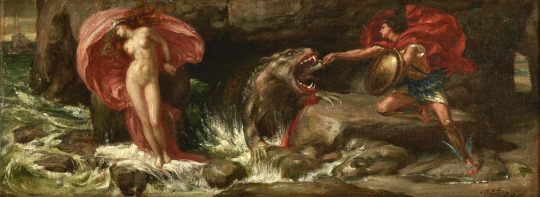
Not surprisingly, Neil has mentioned two parallel child sacrifice stories from the biblical context back in August. The first is one of the big ones — The Binding of Isaac. God's command to sacrifice Isaac, his only son, was a test of Abraham's faith. The angel of the Lord intervenes and provides a ram to be sacrificed in the boy’s place.
The second one isn’t nearly as popular, but you might have heard a variant of it in fairy tales or as the Law of Surprise invoked in The Witcher saga. In exchange for Israel’s victory over its enemies in battle, Jephthah had rashly promised God to repay the debt with the first thing seen on his return back home. The victorious warrior didn’t suspect to see his only child moving innocently "to meet him with timbrels and with dances" though. In horror, Jephthah covered his eyes with his cloak, but to no avail: ultimately, he was forced to honor his vow to God, and the girl was sacrificed. As grisly as it might look like in the Old Master’s paintings, it’s important to remember that human sacrifices weren’t limited to physical offerings only — Jephthah’s daughter might have been offered to God in the sense of officially shunning her family and dedicating her life to service instead, probably sequestered in a temple somewhere.
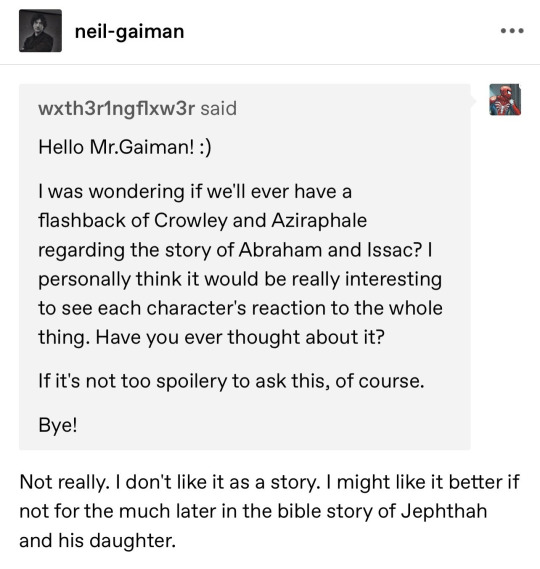
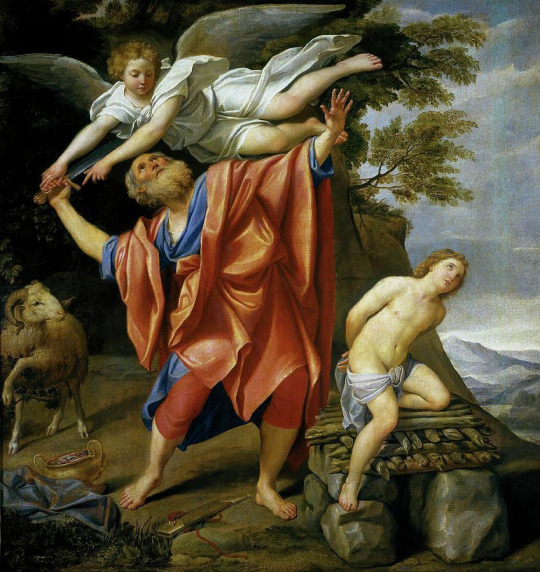
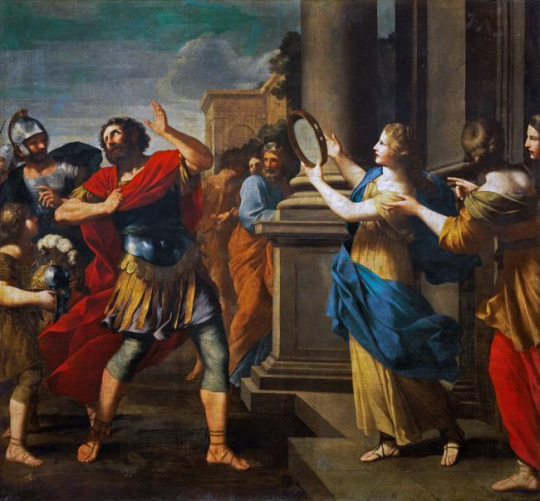
Interestingly, the main character of a big chunk of the Bible and the reason for the Second Coming happens to be THE most influential child sacrifice in the modern history. You know, a certain 33-year-old carpenter sent by his Heavenly Father to die on a cross for the sins of the mankind? Someone better call Aubrey Thyme ASAP.
Circling back to Aziraphale, he could be also seen as a representative of the concept of filial piety, since Eden willing to personally take a Fall not only for the humanity’s collective or individual transgressions, but the shortcomings of his Ineffable Parental Figure as well. Our favorite angel angel always fights for what is right and good, sure, but why would that be even a thing if God was truly omniscient, omnipresent, and omnipotent?
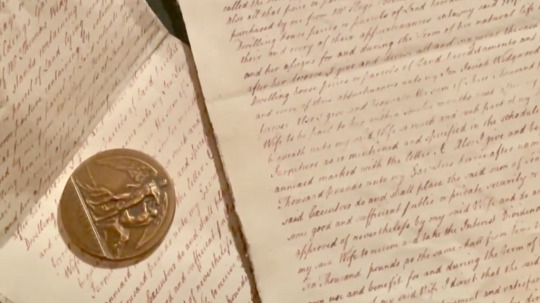

If Aziraphale’s medal is anything to go by, it looks like we might get an answer from the way it’s introducing another mythological narrative into the game, that is the story of Daedalus and Icarus. The most absorbing thing about this is the stark contrast to the recurring child sacrifice references for S3 mentioned in this post — Daedalus isn’t a father who wanted to sacrifice his son, it was his attempt to save him from imprisonment that ultimately drove Icarus to his death. The boy ignored his father’s explicit instructions, committing the grave and culturally universal sin of disobedience to one's parents that simply couldn’t go unpunished, one way or another.
But Icarus’s transgression could be seen both as high-flying ambition and striving for personal accomplishment as well as humanitarian sacrifice for knowledge and humanity’s advancement in general.
Similarly to a certain angel who left everything for what superficially seems like a work promotion, but is the ultimate act of love — both for his demon and the children they have been protecting and nurturing together for six thousand years. From the very Beginning, his white wings have been shielding everything he holds dear in this world.

#happy easter#child sacrifice#greek mythology#bible fanfiction#good omens#good omens meta#never skip the intro#peter anderson studio#easter eggs#nebula#archangel michael approves#sword fighting with snakes#prince and the serpent#supreme archangel aziraphale#bamf aziraphale#aziraphale needs a hug#aziraphale#crowley#yuri is doing her thing#daedalus and icarus#cepheus and andromeda#abraham and isaac#jephthah’s daughter#god and jesus
157 notes
·
View notes
Text
Self-reblogging for anyone who wants a quick refresher on the Jephthah story. For Reasons™️.
A Companion to Owls is such an underrated minisode. I think a lot of viewers don’t realize how much of that is a DIRECT pull from the Bible.
Like, God actually makes that bet with Satan. The poor dude actually gets his kids killed and replaced with new ones (sometimes pastors wave that away with “well, his old children are waiting for him in heaven”). God actually goes on that long-winded petty rant about how Job shouldn’t question what God’s doing because he didn’t make stars and oceans and leviathans and behemoths. Bitch we SAW why you did it, you were literally just dicking around, trying to prove a point to Satan! Mysterious Ways(tm) my ass!
For, um, obvious reasons, it’s not a very popular Bible story to cover in church. Which is a shame, because it means secular/casually-Christian viewers don’t realize IT ACTUALLY GOES EXACTLY LIKE THAT FOR REAL.
#jephthah#good omens#good omens spoilers#good omens 2#good omens 2 spoilers#good omens 2x02#a companion to owls#and yes it is SUPREMELY fucked up that Isaac lives but then the Jephthah story is like lol nope
129 notes
·
View notes
Text
My bible-referencing Christian-critical posts never take off bc atheists dont read the bible and ex Christians dont know the names of the women.
0 notes
Text
Oh Mary, Our Lady of Sorrows
1 note
·
View note
Text
feeling very much like Jephthah's daughter rn
0 notes
Note
anglo-spheres have the Bible. And even then they only focus on Genesis :(
So...so far we have in greek mythology Hollywood news:
The return
Nolan's Odyssey
God of war
Penelope animated movie (scifi school setting)
Disney's Hades
Miller's Circe
A 300 prequel
I feel tired just from that list because i know the results of them and the reactions it will cause.
Same, same! I feel so tired! I desperately need the Anglosphere to get obsessed with other mythologies real quick
#ugh#the book of judges is PERFECT for this???#there are multiple stories in Judges where women are in power and powerless#Like Deborah#or Jael#or Jephthah's daughter#or the levite's concubine#perfect for the theme these people want to explore#instead of butchering bible cosmology and pretending you're rebelling against the big big religion#explore the PEOPLE in the Holy Book#urgh#queued
12 notes
·
View notes